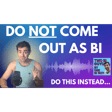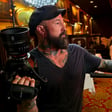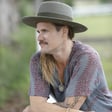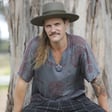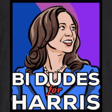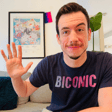Introduction and Episode Overview
00:00:12
Speaker
Hello everybody, welcome to Two Bye Guys. We'll get right to it in just
Interview with Wayne Scott: A Unique Journey
00:00:16
Speaker
a minute. Today we have a really cool interview with an author named Wayne Scott. He is a married bye guy with a story similar to some of the guys from my book, but he wasn't in my book because he wrote his own book and it's very good, so you'll hear a little bit about his story. in a moment i just wanted to pop in here and announce that i am resuming group coaching beginning this sunday march 2nd at 3 p.m pacific 6 p.m eastern these sessions will be donation based pay what you wish it's free to sign up there's going to be a link in the show notes and also in our bio for two by guys and i'm going to change up the format of it it's going to be shorter sessions we used to go two hours or more
00:00:56
Speaker
Now it's just going to be 75 minutes. Everyone will have time to share and talk about what's going on for them and what brought them to group coaching. Then we'll do one or maybe two coaching demos where I'll coach someone in front of the rest of the group.
00:01:10
Speaker
There's a lot of value in being coached in front of a group. There's also a lot of value in seeing someone else be coached. You learn a lot about what you're going through by seeing someone else process in real time what they're going through. For now, I'm going to do these every other Sunday. So it'll be March 2nd, March 16th, March 30th. If there's enough interest, maybe we'll add another day, maybe during the week, a
Bonus Content and Wayne's Background
00:01:33
Speaker
weeknight. And if you want bonus content from 2 Bye Guys, there is bonus content with Wayne from this interview.
00:01:39
Speaker
Check out patreon.com slash robertbrookscohen. And now without further ado, here is my interview with Wayne Scott.
00:01:59
Speaker
Hello, everybody. Welcome to another episode of Two Bye Guys. I'm very excited for this episode today. It's a topic related to my book and the series last season by men married to women, um another author and writer.
00:02:15
Speaker
My guest today is a writer, psychotherapist and teacher in Portland, Oregon. His writing has appeared in The Sun in Poets and Writers, The Psychotherapy Networker, Huffington Post, among many others.
00:02:28
Speaker
And his 2020 New York Times essay titled Two Open Marriages in One Small Room was adapted for the Modern Love podcast in 2021 and then adapted for Modern Love Amsterdam, the TV series in 2022.
00:02:44
Speaker
And his new book, The Maps They Gave Us, is a memoir that tells the story of a man and woman who fall in love again on their way to getting a divorce, which we're going to talk about today.
The Husbands Out to Their Wives Group
00:02:55
Speaker
Welcome to Two Bye Guys, Wayne Scott. Hi. Yeah, thank you so much for ah for inviting me, Robert. Yeah, it's so nice to meet you. And I'm glad we kind of connected randomly, but it turns out we we have some ah much in common. And i saw I just joined this How group and I saw you have been in there for a while.
00:03:15
Speaker
Yeah, since about 2007, I've kind of come and gone from the Husbands Out to Their Wives group, um partly because of the volume. It's it's a pretty significant volume of of kind of back and forth through through different members. It's a very lively group.
00:03:29
Speaker
And ah so, you know, i've got I've come and gone over over the years. but yeah But I mean, and actually, I've gone to their conferences. You know, I've got ive probably gone to three or four of their conferences, which are wild. If you have never gone to them, they are just to be in a room.
00:03:43
Speaker
like They're full. i mean They're just packed with all men who are bi, queer, gay men married to women out to their world. Wow.
Motivations Behind Wayne's Memoir
00:03:52
Speaker
Cool. I actually am trying to go to the next conference and maybe do some kind of workshop or something, but I want to go and just getting in that group and seeing how many messages get posted every day. I mean, it's so active. It just really confirms my suspicions that this is a very, very common but hidden experience. Exactly. Good way of putting it. Yeah.
00:04:15
Speaker
Yeah. Yeah. So I don't like i haven't read your whole book. I will admit I read ah ah the first few chapters and I'm eager to read more. It's wonderful. It's like I'm fascinated by the topic, obviously.
00:04:29
Speaker
And there's a lot of interesting details that don't always come up. So I want to get into that. But um I guess just start by telling me, like, why why did you want to write this
Identity and Challenges in Marriage
00:04:39
Speaker
Yeah. um So it's a good question. So um I actually never saw myself as someone who wrote books. I wrote short essays, um personal essays, reviews, things like that.
00:04:50
Speaker
I had little kids, like so you know you don't have much time. And so mostly I could do is eke out little short essays. But over time, as my spouse and I were doing this experiment of moving from kind of conventionally monogamous couple to non-monogamous.
00:05:06
Speaker
um We kept having these interesting experiences and I would write an essay about them. And when I strung all the essays together and I looked at them as a whole, I realized, okay, number one, I have the makings of a book if I just fill in a few cracks here and there.
00:05:19
Speaker
But the other thing that really struck me is that even though this was a story of two people, for most of the memoir, the two people, the couple think they're getting divorced. It's, you it's one of those miserable periods between when people decide they're getting divorced and then when they actually figure out like, are we actually going to jump off this clip and do it? Or are we going to do something else?
00:05:39
Speaker
um During that whole period, um where i thought we were divorcing it actually looked a lot more like a love story um of two two characters who were kind of rediscovering their love for each other and and maybe in many ways a different kind of love a deeper more compassionate understanding of where each of us were coming from at that stage in our lives right and i think you know it's interesting even though we're a mixed orientation couple i don't think it's so different from a lot of other marriages, straight marriages, marriages between men or marriages between women in that sometimes you lose ah part of yourself.
00:06:15
Speaker
Like you can feel lost and the in the in the demands of marriage and raising kids and having a house and a mortgage and all that stuff. You kind of forget who you were. and that definitely like happened for me. um Like at about at about year 14, I'd had a bit of a crisis and i realized that I had just, I had forgotten myself.
00:06:35
Speaker
And I was lonely and I was kind of desperate. And the very saddest part of that was that i I couldn't figure out a way to talk about it with my spouse without it seeming like I was asking for a divorce. Because obviously, when you talk about the fact that I can't i can't not have some kind of relationship with other men, um you're breaking your vows.
00:06:55
Speaker
You're like, we had we had signed up for very conventional divorce. The vows, that's the maps they gave us. they gave it When you you sign up and you get married, they ask you to make a vow of fidelity. we were We were told very specifically we had to do it.
00:07:07
Speaker
um And so I didn't know how to talk about the crisis I was having to her um because I thought I would be, even by saying something, I would be breaking my vows and we would have to get divorced. And I didn't i didn't want to get divorced. I was confused. I was like, I wanted to be with her, but I also wanted to be true to myself. And like, how do I fit that in this heteronormative container?
Societal Norms and Marriage Expectations
00:07:27
Speaker
Right. Wow. i have I already have so many things to say and we haven't even started talking about the story itself. but But it's a really interesting way that you framed it of like losing something about yourself that you have to read find and also then connect with your partner. And I agree completely that that is like such a common thing, even outside of the queer, bi stuff. Like ah that maybe happens to everyone. And that causes so much tension among partners when you can't find yourself or you're losing yourself and you have to do that. Yeah. And and the losing, it's so gradual and so insidious. You almost don't see it happening. Cause like the weird thing about our relationship is that we knew who we were when we, when we signed up, when we got together,
00:08:14
Speaker
i I identified as bisexual. She knew that she identified as a feminist straight woman. We knew who each other were. Right. We actually never really intended for the first five years were together. We didn't think we were going to get married. It wasn't in the cards. It wasn't something that we cared about. Right.
00:08:30
Speaker
But, you know, and and so but we did get married for various reasons I could describe or not. We did get married. Then we had kids. Then we moved a couple times. And over the over the over the years, you know, I didn't know how to work it into the conversation about being bi, especially as a man in a monogamous relationship. Like, why was i why would I be telling people this part of myself? Other than for me, there were really deep cultural, historical, personal reasons that I identified with the queer experience. You know, being a boy who grew up being bullied, like,
00:09:05
Speaker
forever, you know, um not fitting into a certain gender stereotype um and feeling the kind of outsider-ness, the outsiderhood that comes with that. You know, so there are lots of ways in which I missed my queer friends.
00:09:19
Speaker
You know, I miss having a more solid belonging in the queer community. But, you know, when you're head when you're very straight passing, you're heterosexually married and you have three little kids, you're not really in that world anymore. There's not there's not a lot of time to be in that world.
00:09:35
Speaker
And so over time, you know, I stopped mentioning to people that that had been a part of who I was. Now, maybe they read essays I wrote, you know, or maybe they, you know, saw other things, but it often it didn't come up in conversation anymore. i I was struggling to figure out, well, why am I telling people this anymore since I'm I'm in this particular container?
00:09:54
Speaker
um so I lost. Yeah, I lost. I lost track of myself. that That makes so much sense, and especially when it comes to bisexuality, which is so easy to become hidden, especially in a straight-passing relationship.
00:10:07
Speaker
like I'm now working as a coach and working with not all, but mostly people in a similar situation who are bi men married to women and working something out with their wives, whether it's opening things up or just finding themselves and finding ways to express their queerness or bisexuality within a monogamous marriage.
00:10:29
Speaker
And that's often the hardest part is like, even if you're on the same page about opening up or not, ah it's like, how do you find these other ways to express this? How do you stay connected to the queer community and have queer friends?
00:10:44
Speaker
And something that you said, is something that a lot of my clients talk about and struggle with which is like it's hard to even talk about these things without it seeming like something else is going on. It's hard to say I'm unhappy with the current situation without it seeming like I want a divorce, or it's hard to talk about my attractions without it seeming like I want to go have sex with someone else.
00:11:12
Speaker
Right. So i mean how do you navigate that? Yeah. Well, I mean, the thing is, I think recognizing the stranglehold that we're in as a culture and that it's a marriage divorce, a binary, And there's not a lot of room in between. There's not a lot of room to think about marriage as an improvisational, creative, adaptive experiment that is unique to two individuals, right? That they are the ones who are creating it. That's not the message we get when we get married. I mean, when you think about like one of the the shocking things for me when we got, we did decide to get married at a certain point at five years in,
00:11:44
Speaker
um And as we're going through the planning, right, we, of course, went into the saying, we're not go it's going to be small, really tiny. We're just doing it to get the certificate, you know, but it became bigger like it does with all couples. It became bigger and people kept piling on different ah prescriptions and recommendations about which conventions we had to follow. The bride had to carry a bouquet.
00:12:07
Speaker
The, that you know there had to be groomsmen. There had to be a best, ma you know a maid of honor, right? And all this kind of stuff. And it and it just gets kind of like ah how it looks is very predetermined.
00:12:18
Speaker
And it doesn't actually feel something in many ways. doesn't actually feel like it looks like you anymore. At least that was our experience with it as people who didn't really plan on getting married. We got married largely because we were getting ready to move cross country as an unmarried couple And my my spouse came from her father was
Crisis and Discovery
00:12:38
Speaker
a first generation German American, very traditional in his worldview.
00:12:43
Speaker
And he was not going to feel comfortable with his daughter going off with, you know, going off unmarried with this guy who, in fact, was just going to go to graduate school. So she's going to go. Oh, she's going to just go off and move across the country unmarried with this guy who won't even have a job.
00:12:59
Speaker
and that was not He was not going to sign over that. So we had to we had to toss him a bone. We decided, you know, we're going to get married. We're going to get it as a way of communicating the strength of our bond in language and terms and conventions that will be understandable to her dad, her grandmother, um other people in our family who wouldn't understand otherwise.
00:13:20
Speaker
Right. Interesting. Yeah, that it makes sense to me, too, that, like, even if you go in thinking like we're getting married for this and this reason, like once you're married, it just like people see it a certain way.
00:13:32
Speaker
You start to think about it a certain way, even if you don't want to like just like that word and all the other words that come with it, you know. it's ah It's an unrelenting fight because I remember in the you know like and when we first when we first got married, the first couple years we were married, we refused to say husband and wife.
00:13:51
Speaker
We kept saying partner, right? But people kept saying your wife, your husband. you know they keep her you know like you just like It was like we were being kind of pounded down with people saying, no, it's a wife. No, it's a husband. And i was like, okay, who gives a shit?
00:14:02
Speaker
it's It's husband and wife. Yeah. Right. I identify with that very much because like my my wife and I sort of got married at ah but pretty quickly for specific reasons of like safety and we wanted to not get split up by the politics of the world. And so I was very like you know wanting to do it and we like it made sense that we were doing it. But I kept saying in my head, like This isn't a traditional marriage. I would tell people this isn't what you think of as marriage. Like it's this and we're figuring we're writing our own rules, but we're doing the legal marriage thing for specific reasons. And here's the difference. And like I'm explaining it to people and I try to hold that in my head.
00:14:45
Speaker
But it's difficult because you the constant explaining like. Yeah, you can want to create your own thing and do it, but there's constant pressure to do it. Yeah, a barrage of cultural expectations, right?
00:14:57
Speaker
Yeah, yeah, exactly. Yeah.
00:15:07
Speaker
So, okay, I want to like get into this story. I'm sure stuff will come up as we go. um But I love where you started the book. You kind of jumped in to like the most dramatic moment. And I think that that's So um it's a really important moment for many people. And I've coached and talked to people who have been in that situation and it can go different directions.
00:15:33
Speaker
yeah you You know, you started with like when you went to see ah either mediator or couples counselor and you weren't sure which if you were getting a divorce or not, it actually reading it really feels like you are getting a divorce. That's how it reads.
00:15:47
Speaker
When we started down the path, ah my spouse was very clear that she we were getting a divorce. Yeah. Interesting. Interesting. i Like it's a spoiler to me and I'm shocked that that you didn't having only read a few chapters.
00:16:02
Speaker
So I'm really curious to see the transformation. But first, tell us what was that moment like? Like, how did it all come to a head suddenly after 14 years? Yeah, well, I mean, you know,
Exploration of Non-Monogamy
00:16:14
Speaker
requires me to kind of talk about behaviors that I'm not proud of.
00:16:18
Speaker
You know, so i so I mentioned to you that, like, i I knew that I was struggling and I was lonely and a desperate. And I had, you know, really felt like I had lost touch with the queer part of myself, that part of my identity, and that it was...
00:16:33
Speaker
you know And that it could it couldn't be satisfied just by reading books by queer authors or all the different cultural ways in which I tried to keep it alive. that just It wasn't enough. It wasn't enough. And I didn't know how to talk about it with my spouse without it seeming like I was asking for a divorce.
00:16:47
Speaker
Like it was just that's how constrained. the this heteronormative container fell to me and so it ended up being a crisis actually um i um was reaching out to sure how try to connect with men through the internet um my spouse and i share email access to each other's email accounts she needed to look something up in my sent email box and so she found um She found me reaching out.
00:17:12
Speaker
Right. So that was the that was the moment of crisis, the night of crisis. um and That was when it clarified for her. This doesn't work. I went out um and and we actually physically separated that night, like the night that she found out. She just said, you really just need to get out of here.
00:17:29
Speaker
And so she just felt very, understandably, she felt very, very deeply betrayed. And so I moved out and then there was this whole stormy crucible period um where we were trying to figure out what we were going to do. But she was always pretty intense. She was going to get divorced. so But interestingly, the professional that we went to see for divorce mediation, she also did couples counseling.
00:17:51
Speaker
And one of the interesting things in the memoir is that divorce mediation costs $220 an hour.
00:17:59
Speaker
couples counseling. It's cheaper to stay married. Couples counseling only costs $150 an hour. And so it was this ongoing thing with this this professional we saw that we never actually clarified what we were doing.
00:18:11
Speaker
She never asked us. We never insisted because we didn't even want to pay the higher price. Right, right. We didn't want to the conversation partly because we didn't want to have that we talk about money, but also partly because we didn't It was helpful to stay, as unbearable it was as it was, it was helpful to stay in a liminal period and and to just have time to sort it out and try to figure out what really did we want to do.
00:18:35
Speaker
The fascinating thing about it is even though we saw this professional, Lene, for a year, she never charged us. Oh, wow. I didn't get up to that in the book. I was going to ask, which rate did she end up charging? Oh, she she for well, and I won't give a spoiler about why she didn't charge us.
00:18:53
Speaker
It was a mystery to us. And we kept saying after every session, we were like, should we be paying her? so Should we ask this question? But the thing is the only way to offer to pay her was to commit to divorce.
00:19:05
Speaker
We're couples counseling and we weren't ready to do it. We wanted to stay in this in-between place. I think there was part of us that but wanted to stay in this in-between place for a really long time because it's a really big decision.
00:19:18
Speaker
And in some ways it also allowed us not to participate in this cultural imperative that if you have a marriage that's struggling, you need to get divorced. You know, like people judge you you're staying in a marriage that doesn't look like it's um where where you're struggling, where you're not happy or you're not in agreement.
00:19:35
Speaker
um with they We rush people to divorce very quickly. um and And also to sort of thinking that that that what they were heading towards is a failure. And that's not it's not fair to talk about divorce as a failure, as something that's worthy of shame, you know because it's it's just another transition.
00:19:53
Speaker
Yeah. So, right. That, that makes sense to me. Like we often look at these relationship things as a binary thing, including like, does a relationship end or continue as like the only options, but it's so many different forms that things can take.
00:20:09
Speaker
you Even when divorce happens, relationships often don't end. They just transform. And when relationships continue and you don't get a divorce, they often shift and change. And it's,
00:20:21
Speaker
It's different. And so it's interesting that it's almost like a metaphor of of sexuality and gender of like, you didn't want to put a label on what you were doing yet.
00:20:31
Speaker
You wanted to just feel it out and actually explore it without committing to one of the two extremes yet. And then by doing that, you found your path forward that worked for you two.
00:20:45
Speaker
Yeah. I mean, we we live in this time period. It's kind of an exciting time period and people are really looking at culturally, we're really looking at the ways in which we are controlled by these binaries that are handed to us, whether it's male, female,
00:20:58
Speaker
Right. Or gay straight or married, divorced, you know, and it's not the world is not as clearly either or as that. There's this huge continuum of gradations.
00:21:10
Speaker
And sometimes it takes a long time to figure them out, you know, to figure out where you land and how you want to explain and articulate who you are and. yeah Yeah, and who you are. Right, right.
00:21:20
Speaker
Yeah, makes perfect sense. I also there was one there was a quote in that first chapter that I just think is resonated so much. And from what I know of like, friends of mine and people I've worked with and other by people like you're talking about how like that the the queerness can kind of fade away if you're in a straight passing marriage or if other people don't know you wrote you were writing about a friend named grace i think that's a friend that's my mom oh that's your mom oh i meant i meant whoops i missed it okay but you realize like
00:21:56
Speaker
Grace could only reflect the whole of me by leaning on ironies and implied meanings that not everyone in the room grasped.
Irony, Compartmentalization, and Identity
00:22:04
Speaker
grasped This was the beginning of a kind of compartmentalization that protected Ava and me from judgment in the various worlds we frequented around people we loved who we presumed would never understand our unique bond.
00:22:18
Speaker
it would get more rigid as the years passed. And like, i want to ask you about that, but I and just think it makes it, i've I've been in that situation where I'm like in a room where I know something about someone, but they're not ready to share it. And you are kind of tiptoe around it and you both know what you're talking about, but no one else does. And I've been on the other side of that too, before I was out where I wanted people to know, but I couldn't talk about it. So tell me about that feeling.
00:22:48
Speaker
Yeah, well, I was nervous the night the night before we were getting married. i was really I already had this foreboding sense that I was going to be losing a part of myself. And I knew that coming to the wedding ceremony, that we did we didn't call it a wedding. We called it like ah a covenant ceremony. We wouldn't use any of the words. We didn't call me a groom. We didn't call her a bride. We didn't call it a wedding.
00:23:07
Speaker
We were trying. we were trying um but i But I knew that you know at the wedding, there were not only going to be more traditional people like our parents and and aunts and uncles and stuff like that,
00:23:18
Speaker
But we you know her feminist friends would be there who had their own opinions about heterosexual marriage. you know my A lot of my queer community was going to be there. A lot of my ex-boyfriends were going to be there.
00:23:29
Speaker
And so I was having this conversation with my mom the night before. She was going to do a toast at at the reception. I said, my Mom, this is Grace. Mom, is there there any way you can out me a little bit at this and the in your toast?
00:23:43
Speaker
You know, like sort of make it clear that I still know who I am. We still know who I am, but not so much that father-in-law fake will figure it out because I was afraid of my father-in-law. He had a temper. And I really thought if he knew this, there's no way he's going to let us get married.
00:23:57
Speaker
And so that's the beginning of the end, really, in a lot of ways. like And so my mom came up with this really funny toast, which was like really steeped in a lot of ironies, a lot of coded references to me being kind of a unique and special boy who liked to embroider you know her special little boy. you know And she never thought I was going to get married. And of course, when she says that, all these gay guys are like, wah, ha, ha, ha, in the the background.
00:24:22
Speaker
aye And, you know, like, but it but I mean, ah and ah and so it's funny on one level, right? But actually, it's also sad on another level, because already looking at the ways in which irony and compartmentalization, that we were going to lean on those as strategies for safety, but also to our detriment, ultimately.
00:24:41
Speaker
And, you know, one of the things that happens later, you know, if you do get a chance to read the book, you know, one of the things that that evolves that You know, I start to sort of like read all these queer authors from days gone by, our ancestors, Walt Whitman, D.H. Lawrence, E.M. Forrester, James Baldwin, all talking about the ways that queer men find each other through these kind of coded ways, these coded mechanisms of survival that allowed their connections to happen during times when, you know, and most of, for all the authors I just recommended, you could like end up in jail, you know. yeah You can end up in jail for being queer.
00:25:18
Speaker
So there's a long history for queer men and women of communicating through irony and code. Right. And it's really rich and it's really it's part of our survival.
00:25:29
Speaker
And there's also a way in which it's really sad. Right. yeah It's really sad. um right you You know, just kind of like those are also some of the maps they gave us. Right. Are what are queer and feminist ancestors, the ways in which they've lighted the path for us to do things in a different way.
00:25:46
Speaker
You know, I didn't originate the idea of non-monogamy or open marriage. Right. People were talking about non-monogamy. Early, early, like for for centuries, they've talked about it. It's not a new topic at all. But but even though it's been talked about, it's always been a little taboo.
00:26:02
Speaker
And it also like also touches this nerve of like cultural reactivity when you talk about it. And it shows how hard it is to change the culture. Like if if it's been in and out there from those people you mentioned for for this long and it's still taking this long to be normalized, like there's there's a lot of movement lately, but it's it's hard to change that. it's a decade, you know, you have to really change it over generations.
00:26:30
Speaker
Yeah, it takes so much time and it takes people talking about it. Like I like about about a year before my my memoir came out, Molly Roden Winter wrote a memoir called Moore Memoir of an Open Marriage, which is a great, great read about a heterosexual couple that decide to open up their marriage and all the complexity that introduces into their arrangement.
00:26:50
Speaker
And so I really this book this book did quite well, got a lot of attention, but it also got a lot of judgment. Oh, my gosh. I mean, I'm watching what she's up against people being really kind of mean um about what she was doing.
00:27:03
Speaker
ah You know there's so much so so many judgments we have about women who choose to have any kind of ah intimate relationship other than their husband. And she got all of that piled on um in the aftermath of the memoir. So, you know, we do we do these things sometimes at our peril.
00:27:19
Speaker
Yeah, yeah. Well, kudos to you for sharing this story and being part of the movement. And I also think it's it's interesting what you said about like that that moment at giving, you you know, your mom giving the toast was like,
00:27:33
Speaker
what you wanted to happen in that moment, but it was also sort of the beginning of the, of the end. i think you said it's like, was the beginning of the unraveling that would happen later. Cause like that, it just makes so much sense that it's like, it's,
00:27:50
Speaker
it's can feel easier to compartmentalize and it often is safer. And so many people sort of just fall in to that. And then,
Authentic Self-Expression and Relationship Impact
00:28:00
Speaker
but then actually, even though it feels easier in each moment, like over time it accumulates and it,
00:28:07
Speaker
it builds up and it's psychically difficult. And i I'm working with guys who have said exactly that. Like it's sometimes it just feels easier to be in the closet, but they know on some level that, that they can't handle that actually, that they have to do something. But that compartmentalization is so common.
00:28:27
Speaker
Yeah, I just think I think, you know, there's we don't realize the power and the impact we have when we choose to be authentic and honest about who we are, especially in a world that's hostile towards who we are.
00:28:40
Speaker
And one of the most moving things. indirect benefits of us being open with our children is when my daughter, you know, decided to come out when she was 12, you know, and she came out to me while we were on a walk in the forest. And it was like just turning a switch. She just said, Hey, Dad, just FYI, you know, I think I'm queer. It's kind of hard to tell you, but you know,
00:29:02
Speaker
You know, I just wanted you to, you to know. And, um, and it was really, i think it was relatively easy and seamless for her. And largely it was because she had a built in ally in her family, you know, and I didn't have that growing up at all. I didn't know I have any relatives who were queer, um,
00:29:19
Speaker
Yeah. that's Yeah. Yeah. And so like, you know, like, and I just, so I didn't realize it, like i was going I was actually going to make the path. I hope i was going to make the path easier for her. um You know, and and for any of my mother, my other two kids are are very straight identified.
00:29:33
Speaker
Um, But yeah, we we don't know who's going benefit by our own promise. Right. That's beautiful. That's a beautiful reflection because yeah, it's like sometimes you kind of, people know they got to make a change and they want to be more authentic and open, but they don't exactly know like where that'll lead or what that, or what that will get them.
00:29:54
Speaker
And you, pretty much universally in my experience, once people do that, they find these surprising benefits or like moments or connections with people that they didn't see coming. And they, and you know, they it like that just are so worth it that if they had seen it coming, they would have done this a lot sooner, like so much joy and connection.
00:30:17
Speaker
um But it's surprising. And, you know, you often don't think, think about those positives in the moments that are really tense and difficult. Like, I want to get to your story more too, but just like what, what has been,
Wayne's Coming Out Journey
00:30:31
Speaker
i mean, that's a beautiful one there, but what else have been the benefits of like being your authentic self after you kind of went through this process?
00:30:40
Speaker
I think the biggest thing I would say is how curious so many people are about all the different ways we can be unconventionally married and not just non-monogamy, but actually frequently non-monogamy. mean, because when I had so write this essay happened, it appeared in the Modern Love in 2020, you know, Modern Love, you get a lot of attention when something ends up in there.
00:31:02
Speaker
And after that appeared, um both myself and my spouse had various friends, neighbors, people in our lives who reached out to us and hey, could we could we get together for coffee?
00:31:13
Speaker
Could we like have a little chat? And it was all people wanting to have a kind of private kind of like careful conversation about how did you do this? And is this something that I could do for myself or that I could sort of adapt as something that I need to do to help help my marriage, you know, be more fulfilling for me?
00:31:32
Speaker
You know, because, so you know, like when people stay married for a really long time, um it's hard to it's really easy to get into a very stuck groove with each other. And for there not to be a lot
00:31:49
Speaker
Absolutely. Absolutely.
00:31:59
Speaker
Okay, so i want to come back to that question in a minute. Like, how did you do this? Because that's sort of the the key that I think everyone will want to hear. um But before we get there, your story is kind of unique in, I didn't have many stories like this in my book, unfortunately, just cause you know, it's hard to fit everything in, but you many by guys suppress it until a lot later in life.
00:32:25
Speaker
And your story is a little different in that you knew from a younger age, you were not straight. Yeah. And, and had experiences before you met your wife.
00:32:36
Speaker
So, to and and also it was interesting that it was like, in the eighties when there were, when during the AIDS crisis, and that was part of your development and identity.
00:32:48
Speaker
ah So tell me, tell me about that. Like, how did you understand your sexuality growing up? And, and then how did that lead to like, when you met your wife, like leading up to that, how did all that play out for you?
00:33:00
Speaker
Well, one of the, one of the heroes of the memoir is my mom. um Grace. And one of the reasons she's a hero is because, you know, you she had three boys.
00:33:11
Speaker
And one of the three boys kind of stuck up stuck out like a sore thumb as kind of a misfit as a sort of a gender atypical young man. who preferred to play with girls, um cried inconsolably when he was signed up for Little League, and was constantly getting
Navigating Bisexuality and Feminist Theory
00:33:26
Speaker
pounded on by other boys when he went to elementary and especially middle school.
00:33:30
Speaker
And so, know, my mom, you know, and at that and that that era, this was like the so I'm outing myself for how old I am. um And in the seventy s you know, boys were told pretty consistently that if you're bullied, you have to fight back.
00:33:44
Speaker
You know, you got to find your inner courage and you got to like, you know, get violent. And that was just like not an option for me. i so like I was like, that is not who I am. And so my mom would just keep me home from school.
00:33:55
Speaker
Like I would stay home from school for weeks sometimes yeah because that was the safer option. um So we looked at so and at one and one afternoon when we were staying home from school, this is the 70s.
00:34:06
Speaker
Phil Donahue was really big. We would watch Phil Donahue, mother and son together in the afternoon. It's a very it's a very gay guy thing to do with your mom watching Phil Donahue together. And there was this one show about teenagers who were homeless because their parents kicked them out of the house for being queer.
00:34:21
Speaker
Right. And in those days of commercial television, there'd be these long commercial breaks. And during one of the commercial breaks, my mom turned to me and she's like, you know, i don't know what your situation is, but if you ever thought that you were gay,
00:34:34
Speaker
you that would never happen to you. You are never getting kicked out of this house. I know, I know. And you know, when I got all bristly and defensive in the moment, like mom, you don't know who i am. but um But I mean, I think actually I even said something like, I think I'm interested in men and women. I think that's what I said at the time. I would have been 13 or 14 and we just left it at that point. But she kind of, we kind of laid the path that if I was going to come out as anything that she was going to be okay with me. And if you have one parent who's in your, she's got your back.
00:35:04
Speaker
you know, you're going to be, you know, I think you're going to, it makes everything easier. Yeah. That's amazing. Wow. So, yeah. And so when I did actually come out to her when I was 19, I had a boyfriend, the first serious boyfriend that I had.
00:35:17
Speaker
um And when I told her, um you know, she was, she was totally cool with it. um You know, she, as in a lot of families, alert parents can see it coming, right? You know, they they they they they have started to put the pieces together when they notice their kids' kind of behaviors and attractions and stuff like that.
00:35:35
Speaker
um And so it was it was pretty seamless and easy, but it was also complicated because, again, at that era, this is now mid-80s, um AIDS is huge, right? Bisexual is a dirty word.
00:35:47
Speaker
It is not, it is just not a word that people think are valid. People see you as the bridge between the gay community, which is ah like all sick with AIDS. And the straight community, which is not sort of not at that time, at least that was the fiction we had.
00:36:03
Speaker
And, you know, and so there's just like a lot of stigma to saying that you were bisexual. And so I really just kind of like floundered around. so um Some people thought was kind of straightish. Some people thought I was gay, you know, and I secretly would tell people, I i think I really am bisexual. I think I really um have an interest in both.
00:36:21
Speaker
um But yeah, sometimes it was easier just to have people think you were gay. i went to a pretty accepting um college where there was ah there was a very strong faculty gay presence. So we felt very supported in being different.
00:36:34
Speaker
So in some ways it was easier just to say you were gay. Right. it's a i actually highlighted something you wrote in that chapter. to say one slept with women and men was to give ammunition to a prejudiced world. and And it comes in a section talking about AIDS and what you're saying, like, bi men were the bridge. And so, yeah, that makes sense that that it would just be easier to identify as gay, that yeah which which you still hear today, gay or straight. That's often easier for people than Yeah.
00:37:02
Speaker
At that age, you know, this is like in my late teens, early 20s in college, it was very, very hard to say you were bisexual to to young men who were being like disowned by their families for being gay, to say you were bisexual and to have there be an image in the world of it looking like there were gay men who could change to straight.
00:37:21
Speaker
yeah like was this was it was Was to betray one's friends, right? There was no way around It it was so painful for so many people were being disowned and um pressured by their families.
00:37:34
Speaker
And yeah, what friendship can be built on betrayal? That's interesting. Like, it's understandable that gay men would feel that way. that makes sense. And then it's also understandable that straight women would be fearful of their own safety. Like, it's... And yet, that leaves bi men in this position in the middle where, like, they haven't done anything wrong. They're literally being... We're being ourselves...
00:37:58
Speaker
and acknowledging fluidity or bisexuality. And yet, just because of what was going on in the world, that that triggered other people. on that And then bi men feel like they have to hide it and they can't share who they are. Yeah. yeah Interesting.
00:38:14
Speaker
So tell me about then meeting your wife and where you were at that time and what you guys talked about and how your relationship developed. we We met if in a common friendship circle when we were in college. you know We were you know very very progressive school.
00:38:31
Speaker
We both took the same class on feminist theory and practice. right So that was like an early bonding thing. We were both really interested in thinking about gender and sexuality as a construction. um And then I, you know, after ah the year after um college, I just happened
Therapy and Shared Narrative
00:38:47
Speaker
um She was becoming very good friends with the woman who was my roommate, platonic roommate. And so we just were like in much more close proximity with each other. And I just really fell for her. um I didn't understand it at the time. It was really powerful.
00:39:01
Speaker
It was really visceral. Like I'm a wordy guy. I'm a chatty guy. I like to put words to everything to help me figure it out. And when I was around my spouse in the early days, when she first kind of showed up in my apartment, I felt like I was walloped.
00:39:16
Speaker
um Like, like, like physically, like I would have to go out to another room and like, what the hell is going on in my body? Like, I just really hard. I can't look at this woman. I can't make eye contact this with it this one woman without feeling extremely anxious.
00:39:30
Speaker
Interesting. And I didn't know what the feelings were, but i but I actually did start to piece together. Okay, wait a minute. i think I think there's some kind of attraction actually going here. and it's just It's just actually really intense.
00:39:42
Speaker
And um I'm actually not used to it in a lot of ways. Like it was easier for me to have a relationship with man like romantic relationship with men than it was with women because of a lot of the stuff I kind of the baggage that I inherited from my dad and the ways in which he expressed his heterosexuality.
00:39:58
Speaker
um But, but yeah, something, something really powerful happened with my spouse and I just really wanted to be with her. Interesting. Not to boil everything down to gender because this probably is just due to the unique person. But at the time, like how, how did that feeling compare relationships you had been in with men?
00:40:21
Speaker
um how did it compare? I think the biggest difference probably was, um, so this is the AIDS pandemic period, right? So it's a really tense time. um With all of the boyfriends that I had had had up to that point, um we had never been monogamous. Monogamy was never even something we talked about.
00:40:41
Speaker
Right. And it kind of set us up to have some problems. And then at one point, I think it was in 1987, I had a really serious HIV scare. I found out that one of my ex-boyfriends had probably had AIDS.
00:40:55
Speaker
And so it it was a miserable time in that time to find out, to try to figure out your test results was really laborious and difficult. You had to go to an anonymous testing site because it couldn't be part of your health insurance. so Nobody, it couldn't be widely known. And then you had to wait two or three weeks to get the results.
00:41:12
Speaker
Right. And so during this period, I was like, you know what? I don't think this non monogamy or this like having sex with anyone kind of stuff, even though you were have a boyfriend, this this this feels scary. This feels dangerous.
00:41:24
Speaker
And when my wife and I got together and we were dating, we hadn't been dating for more than maybe a month before she said, hey, if we're going to be physically intimate with each other, you have to be monogamous.
00:41:36
Speaker
And for me, that was like this new concept. I was like, what? what What is this magical thing, monogamy you're talking about? You mean we would just be in this safe little cocoon together and nobody would have to worry about possibly getting sick or anything like that? So I actually, at the time, I heard it as this very kind of protective thing that she was offering.
00:41:57
Speaker
You know, like like I had just had this really scary time where I thought I really did think I was going to die. yeah. and um And it's really just through the grace of God that somehow I was not HIV positive.
00:42:09
Speaker
um And so she was offering me a kind of protection and it felt very much like a kind of love too. and And something that nobody else had offered to me at that up to that point.
00:42:20
Speaker
So that was really powerful for me. And then I think too, because, and this is, it's in the memoir that like had a very conflicted relationship with my dad. And the dynamics of that the relationship with him seemed to spill over into all my relationships with boyfriends.
00:42:34
Speaker
You know, or I was always disappointed with them. I always felt kind of rejected by them and things like that. so the pathway, the emotional romantic pathway with men had never felt easy for me.
00:42:46
Speaker
Interesting. Wow.
00:42:55
Speaker
So then you got together, you got married, and then it's 14 years before the couples counseling begins. that right? We're both social workers. We both got graduate degrees in social work. So we're like really into going to therapy. like oh um And so we we had had many experiences in doing couples work before.
00:43:14
Speaker
um but But yeah, when we when we had the crisis, we we we went to this this professional who was both a divorce mediator and a couples counselor. um And yeah. Okay. So, I mean, we're skipping a lot because we don't have ah enough time. Everyone should read the book and hear everything, but tell us like what, so what happened next? You're you, it seems like you're going to get a divorce. That's sort of ostensibly why you're there. Although you haven't defined that.
00:43:41
Speaker
What, how did that shift things? Like what, what changed next?
Open Marriage as a Turning Point
00:43:46
Speaker
Yeah, the this divorce mediator slash couples counselor, the first thing she said to us, she said, this is the first meeting. She said, you know, if you're going to get divorced, you really need need to have the first thing you need to have is you need to have a common story.
00:44:00
Speaker
You need to have some shared narrative that you both feel comfortable enough with that can be the basis of what you say to your family and your friends and your neighbors and your kids.
00:44:11
Speaker
Right. and Because because a lot of times what happens when people are divorcing is they have these very polarized adversarial narratives about what happened in their marriage. And that is such a recipe for disaster for everybody.
00:44:24
Speaker
And so and she gave us this challenge. She said, you have to come up with your common story. And of course, I'm a writer, right? Also, so I always, I'm always thinking about, well, what makes a good story, right? And these two questions, like what makes a good story and what makes a good marriage became interestingly kind of intertwined throughout the memoir, the period of the memoir.
00:44:45
Speaker
um And I'm thinking about, you know, how do we tell the story of who we are? um And as part of the couple's work we did, you know, a big part of couple's work is listening. listening to each other's story, listening without defensiveness or reactivity. So like, I really had to like put my ego aside, put my own feelings aside and really listen to my spouse and listen to her.
00:45:05
Speaker
What was her experience being married to this queer guy who was struggling with his identity? You know, cause there's really, her experience of the marriage was really different from mine. And I had to kind of put my experience aside to be able to listen and truly deeply understand what it had been like for her. She felt betrayed and i really needed to get that.
00:45:23
Speaker
Um, And that's hard, I think, when you're feeling like, hey, I'm sad and lonely too. This didn't work for me. But you know who gives a shit? You have to put that aside for a minute. you There'll be time for you you. You'll get listened to eventually. But right now you need to really figure out a way to be more attuned to what you've put this person through. interesting And so it it was through the process of listening more closely and deeply to our separate experiences in this marriage that we were able to get to a different place. We were able to see each other as characters in a story in a deeper way.
00:45:56
Speaker
Right? That's so interesting because like I've heard that before. like We need to be telling the same story about our relationship or at least be on the same page. But often I hear that as like, if we want this marriage to work, that's what we need to do.
00:46:10
Speaker
So it's interesting that this person was like... Even if you're getting a divorce, you still need to come up with the common story. But then it's like the same process. And then it led to reconnecting.
00:46:22
Speaker
I'm just curious, like how because so many people I know and work with, um they they feel like they're at an impasse, right? Like, I want this. She doesn't want this. yeah How can we ever...
00:46:34
Speaker
make that work. And so to how did how did you break that log? gen like I know it's just sort of getting to know each other better, but how did it actually shift things then?
00:46:45
Speaker
Well, there's another really key point, and this could only have happened in this century, because it would not have happened in the last century. But at a certain point, I think we've been working with Linnae, the couples counselor, for nine months, maybe a year.
00:46:59
Speaker
And a certain point, Linnae said, it seems to me that the two of you are together. it seems to me that the two of you are actually pretty in love and then devoted to each other. Have you ever thought about having an open arrangement?
00:47:11
Speaker
And we were both shocked because I thought that was a dirty word. I thought that was, I thought, I thought professional licensed therapists were not supposed to say that word. That wasn't how I was trained because I'm a therapist too. And I, it was really taboo to mention non-monogamy as a couple's therapist, but Linnea was very matter of fact about it. She said, you know what?
00:47:31
Speaker
I have other clients that are in open arrangements and they make it work. Yeah, it's complicated. It's challenging. There's not the same social support. But if you want to make it happen, you can choose to make it happen. It's your marriage. It's not somebody else's marriage.
00:47:44
Speaker
And that was super powerful for us to have a professional say they can work if you want them to work. Yeah, um right. And so so we were like stunned for about a week and didn't talk about it.
00:47:55
Speaker
And at a certain point, I said, you know, could we I offered to my spouse, I said, like, could we could we go down this path as an experiment? Could we try it for a period of time? And if it doesn't work.
00:48:08
Speaker
And if you decide you want to work a conventional arrangement with another guy, you know, I, I, I, I'm like a big, I'm not like protective of money or anything like that. I'll give you a super easy divorce. Like we'll make this so easy on you, but we'll least know that we tried everything to see if we could make something work.
00:48:24
Speaker
Um, and it ended up actually, so we did, we we, we, we, we started the experiment. We called it the experiment. We started the experiment and, it ended up being good for both of us. You know, we, it ended, it meant that we were inviting other people into our lives who actually helped us grow and understand ourselves in different ways. Like I actually think that the men she saw were good for her, not only good for her, they were good for me. Yeah.
00:48:49
Speaker
yeah Cause I ended up having relationships with them too. Not deep relationships anything like that, but I always met them just like anybody I was going, just anybody I was going out with, she met. Oh, interesting. So yeah, we so we tried to keep keep keep tabs on each other in that way.
00:49:03
Speaker
That's cool. That's interesting. And it it also speaks to just like, you can do this any way you want. You can do it where you ah you meet each other's partners or you can do it where you know nothing about the other's partners. or like And in my case, like I don't necessarily meet all my wife's partners, although I have sometimes.
00:49:21
Speaker
yeah ah But like we talk about it and I learn stuff about my wife and about myself from talking to her about other relationships. And it helps... strengthen what we have just because of the information. It's just good information to know.
00:49:36
Speaker
Yeah, i was I was so
Overcoming Insecurities in Open Marriage
00:49:38
Speaker
threatened. I was surprised actually by how really discombobulated I was when my spouse started dating other men. It brought up so many issues about my own inadequacy and my own ah insecurities as ah as a male person and stuff like that.
00:49:56
Speaker
And this guy that this first guy that she dated was an extraordinary soul and he would send back gifts to me. Gifts. to me. um you know ah he Once he sent a a jacket um or a scarf or once he gave us tickets to the theater, like he did all these things to kind of neutralize any sense of threat I must have felt. like I would like think, I really should not like this guy. I really should be more jealous or hostile towards him. But then he would send him a piece of clothing. I was like, um but i i like that I do like that shirt though.
00:50:30
Speaker
um And so, you know, like it just I we just met a lot of very big hearted, generous people along the path to to doing this. Interesting. That's so cool.
00:50:42
Speaker
I'm curious because this is something like so many men in this situation struggle with is like. they know what they want and that they can see the vision of an open marriage working and they want to stay with their wives, but also not have to shut down this other side of themselves, especially for bi men.
00:51:03
Speaker
And, and the impasse often is like their wives just say no, and they've never wanted an open relationship and they can't imagine it and, you know, it's like an ultimatum. It's like, if that's what you want, then we're not going to be married. And, and it sounds like that's sort of where your wife started. And, yeah and maybe when you got into the relationship with AIDS happening, like that makes a lot of sense.
00:51:26
Speaker
yeah And then even later, like you just haven't ever seen that vision for your life. So it's hard To imagine, and it's easy to just say no, and society backs you up and just saying, no, I don't want that.
00:51:40
Speaker
How did, um I'm not interviewing her, so it's not, we won't go too deep into her mind, but how do you think she was able to see that possibility? And how did you work that out between you?
00:51:55
Speaker
Well, i i can know I can say the stuff that's in the book. And then she also like kind of approved me to say a couple other bullet points about her perspective. Because I've been asked a couple times, like, what does she think about this? Or why did how does she do that?
00:52:06
Speaker
um I would say that um she in in the memoir, she goes down this path quite ambivalently. You know, it's it is a very threatening path for anyone to go down. But I think especially I think for for many women, I think part of female socialization is to feel more threatened and betrayal um by marriage being done in less than a kind of conventional way. I i think I'm OK saying that.
00:52:33
Speaker
um And so it was really threatening. She was she was ambivalent. And that that persisted for a lot of the experiments, you know, that she she still struggled. But, you know, it was kind of balanced out by. But, yeah, I do actually really love this guy.
00:52:46
Speaker
And, you know, he is a good dad. And, you know, i was always clear in my head, like, I actually am not pursuing long term, exclusive romantic partnership with a guy or with anybody else. I actually really i have always wanted to just to be primarily with her.
00:53:01
Speaker
um And we set up a lot of agreements, you know every non monogamous couple, you know, because it's not handed to you, you know, what the container looks like, you have to come up with agreements about how you're going to do it.
00:53:12
Speaker
And we were really protective of our partnership. um We did not bring any of our partners to the family home unless there was an explicit agreement with the other person that we could do that. But generally, we didn't do that.
00:53:25
Speaker
um We kept doing kept our what we were doing in our romantic lives pretty separate from the business of raising our kids and living under the same roof. And I think that really helped us. We kind of it built it built in a kind of protection that made it easier when it was scary.
00:53:40
Speaker
It was scary for both of us, though. i Tell me a little more about what was scary. And also like my, the question that came up for me is how did you handle her ambivalence about it? Cause I mean, I'm guessing you got to a point where she's less ambivalent about it. And ah although I don't know, cause I haven't finished the book, but how did you navigate that and stay true to what you were looking for while, while, you know, with her ambivalence there?
00:54:07
Speaker
Yeah, I, I, I, You know, I was, you know, I said I was raised by a really strong mother and I had a very close relationship with her. and you know, I was like intent from a very early age. I wanted to be the best little boy in the world.
00:54:21
Speaker
Right. And then, you know, when I got to be when I was a boyfriend, I wanted to be the best boyfriend in the world. And then when I was husband to my spouse, I wanted to be the best husband in the world. Right. i had this perfectionistic way. Like I never want to do anything wrong. Right.
00:54:34
Speaker
And part of what I had to let go of is okay, i am not going to be the best husband in the world. You know, like I am not going to be the perfect husband here. There are going to be times where she's unhappy or uneasy with things that I'm doing, but, but we still have a basic understanding that we're committed to each other.
00:54:52
Speaker
And I'm just going to tolerate that. This is a time in our marriage where, Maybe she's uneasy or unhappy or anything. anything Like it was in the in the early stages when either one of us would go out, it would be hard for whoever stayed home with the kids because you just would feel this left out feeling. Even though rat your rational mind, you're like, I said he could go out or I said she could go out. It's fine.
00:55:12
Speaker
But like on a visceral level, you're like, Why am I home watching Bear in the Big Blue House with the kids again? I would like to be out having fun too. um so but that But that dissipated over time, especially as we came to see that um we both got a lot of benefit and growth from the people we were meeting.
00:55:33
Speaker
you know We were both changing and healthy in healthy and meaningful ways. Not just me, right? She actually found things by being with other men too. um And so, yeah, so I think we we, and then as time passed, you know, neither one of us kept, we kept showing up for each other. Neither one of us was going anywhere. And so after a certain point of time, it feels odd to say, to to be to to be fearful that she or he is going to go away because he hasn't so far,
Redefining Marriage and Personal Values
00:55:57
Speaker
you know, like, I mean, now we've been we've been together for over 30 years now.
00:56:02
Speaker
Wow. Wow. So it's even more time since this moment. Yeah, it just started in 2007. So, you know, it's been a while. in a while Cool. Wow. So will have to wrap up in a minute and then we'll, so I'll stick around and we'll, we'll get into it a little more, but just to wrap up here, like where are things now and what have, you know, i love that you've learned things and both of you have learned things from the relationships you've had. And it sounds like it's benefited both of you, like just to sort of take us to the present, like,
00:56:37
Speaker
Yeah. Where are you now? what What have you enjoyed about this journey? and And also, I guess maybe if you want to get to this, like what advice do you have for other people who are navigating something like this?
00:56:49
Speaker
Yeah. um Interestingly, when our last kid moved out of the house, a lot of people we found expected that this would be where my spouse and I would part ways.
00:57:00
Speaker
And and but it was so odd to us. We kept hearing that from people like, well, now you guys can you can leave each other easily. I'm like, wait a minute. We haven't done all this work.
00:57:11
Speaker
Yeah. We feel solid in our bond to just leave each other. we The reason we stayed together was that we always enjoyed each other. We enjoyed each other even during times we were angry at each other. um And so you figured out how to make it work in ah in a better way. Why leave it now?
00:57:27
Speaker
Yeah, no, I mean, in a lot of ways, too, it it for me, at least, it took a lot of pressure off the primary relationship, you know, like many couples deal with like discrepant levels of sexual desire and frequency of sexual wanting and things like that.
00:57:41
Speaker
And I don't really have to deal. I don't really have to deal. It's nice to not have that pressure on my primary bond. You know, we still live in the same house together. we both enjoy keeping the house. We, you know, we're, we are always planning our next vacation, always planning the next visit with our children.
00:57:57
Speaker
um You know, we're, it's, it's a very nice stage of life to have a lot of free time. um and to be able to do more things than we could when we were raising kids. and And also I will say we both miss our kids desperately.
00:58:09
Speaker
Uh-huh. Uh-huh. Yeah. And yeah, go ahead. yeah go ahead Oh, I just you said something about um advice. Yeah. yeah And, you know, and I don't I think the book is a story and and and the story may have some ideas for people about how they can be patient with the process of finding themselves within a marriage and how they can.
00:58:34
Speaker
to reimagine and reinvent marriage, even though we get a lot of supplied stories about what it's supposed to look like. You know, so i so I hope like it gives people the courage to to make their own marriages, to make the to make the marriages that are going to fit for them.
00:58:49
Speaker
um and you know, maybe give them courage to defy social conventions and expectations and judgments. Yeah. Yeah. Beautiful. Yeah. That's the truth about like, that's what queerness taught me is like, there are all these rules we think about, but actually you don't have to abide by most of those rules. They're, they're norms that, and many of them are not actually benefiting most of us. They exist for certain reasons. And you can, you can write the rules of your relationship between whoever, you know, whoever's in it gets to write it and create it however you want. And
00:59:23
Speaker
Yeah. Marriage, the the reasons for why people marry, why marriage looks the way it does, you know, in the conventional sense, they're ancient. You know, they go back to an era where where love wasn't even part of the of the mix, you know, so, you know, so it's so it's okay to update it.
00:59:38
Speaker
Right. i There are so many things that are possible now that that certainly weren't possible 100 years ago, but weren't even possible 10, 20, 30 years ago. ah And so why not explore the possibilities? is Why live by the rules that were written so long ago?
00:59:56
Speaker
Yeah, absolutely. Absolutely. Last question. what's the What's the story that you tell now? Are you on the same page about what sort of happened and how do you what's the narrative in ah and a short form?
01:00:11
Speaker
I can't say what the story that she would write would be. I don't, I mean, I don't, I don't fully know. I know that she, I run everything I write about us by her. So she, she, she should not be surprised by anything I write, write about her. Cause you know, she either either reads it or I talk to her about Um, so yeah, so the common story, I think the common story is a lot of the common story is what is in the maps they gave us.
01:00:35
Speaker
Um, yeah that's, that's kind of, that's what I hope the achievement was, at least from my end, but definitely if she had been writing it, um, there was another book about marriage that came out like within the last year by Harrison Scott Key, how to save your marriage. And it's about a marriage in the aftermath of infidelity.
01:00:50
Speaker
And his wife actually contributes a chapter to it. which I was really impressed by. i was like, that's a really interesting idea. You go through the whole seven chapters of the guy's story and then you get one chapter of what she thought about it. But that's not what we had. Yeah.
01:01:03
Speaker
Interesting. Cool. Well, everyone should read the book. I'm really enjoying it so far and plan to continue. where Tell people where when it comes out, where they can find it, where they can find your but your website and work in general.
01:01:18
Speaker
The book is out. The book should be in bookstores near folks.
Promoting Wayne's Book and Conclusion
01:01:21
Speaker
You can order it from Black Lawrence Press, which is the small independent press. um And it's always great to patronize small independent presses. You know, they're the they're the little guys in the big struggle.
01:01:30
Speaker
You can go to my website too, which is waynescottwrites.com. And then you can also see like, that's got the modern love essay and the podcast and all the other things I've written ah in this area. So yeah.
01:01:43
Speaker
Cool. Awesome. If did if the people looked out, look for some of the other stuff. Yeah. Awesome. Awesome. All of those links will be in the show notes. You can find them there. Yeah.
01:01:54
Speaker
yeah Well, so so I want you to stick around ah for Patreon for if you're subscribed us on Patreon, we're going to talk a little more. ah but I want to hear some more practical details, actually. That's kind of what what I'm interested in, but we'll see where it goes. So patreon.com slash Robert Brooks Cohen. If you're not there, you can hear it.
01:02:12
Speaker
Thank you for sticking around. and But for those of you leaving us for now, Thank you, Wayne, for being here. I'm really glad we connected through your publicist and then realized we were we had other connections too. um I just think there's so many people in this position and these stories are not often told. That's why I wrote my book and similar for you, I think, but it's like really an interesting story and the way you write it so far, I'm loving and it's very open and vulnerable. so
01:02:44
Speaker
So thanks for sharing your story and thanks for coming here. Thanks for the conversation. This was great. Thanks for listening to this episode with Wayne. If you want to hear the bonus content, we talked about bottoming. He told some interesting stories about bottoming.
01:02:58
Speaker
And we talked about just other things he has been exploring as part of his open marriage. You won't want to miss that. Check it out. Patreon.com slash Robert Brooks Cohen. If you subscribe, you also get early access and you get video of every episode. So who knows what I'm wearing in this video right now? You only know if you're on Patreon.
01:03:18
Speaker
Cool. That's it. Bye. Thanks for listening.
01:03:24
Speaker
Two Bye Guys by One Bye Guy is produced and edited by me, Robert Brooks Cohen, and it was created by me and Alex Boyd. Our new logo art is by Caitlin Weinman. Our music is by Ross Minzer. To help support this podcast, visit patreon.com slash robertbrookscohen. You'll get full video episodes, early access, and bonus content. Visit robertbrookscohen.com to learn more about my coaching, my book, and my stand-up comedy. And thanks for listening to Two Bye Guys by One Bye Guy.
01:03:52
Speaker
Oh, oh, oh, oh, oh.




